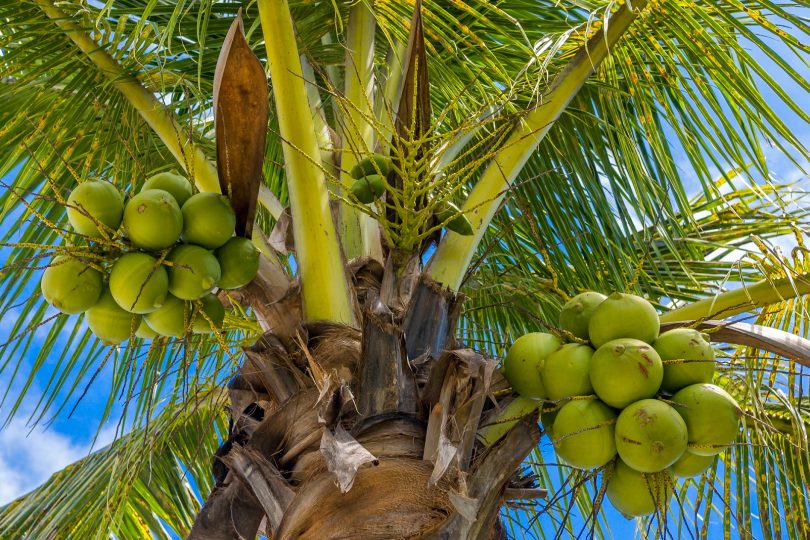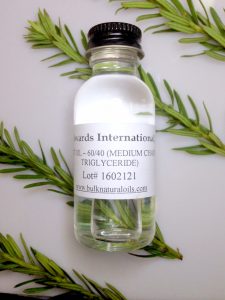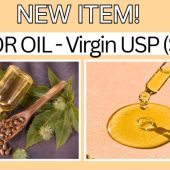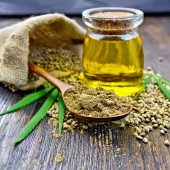The nature of raw ingredients can be confusing to those new to the market. A frequent question that surfaces at Jedwards International is about MCT and Coconut Oil. What are MCTs? What are the similarities and differences between MCT Oil and Coconut Oil?
MCTs, or medium-chain triglycerides, are a unique form of fat whose name comes from the way the carbon atoms are arranged in their chemical structure. All fats are composed of carbon and hyrdrogen, however they vary in length. By definition, short-chain fatty acids have 5 or fewer carbons, medium-chains have 6 – 12; long-chains greater than 12. These fatty acids are all classified as Medium Chain Fatty Acids:
- Caproic Acid – C6 (six carbons)

- Caprylic Acid – C8 (eight carbons)
- Capric Acid – C10 (ten carbons)
- Lauric Acid – C12 (twelve carbons)
Until the early 1980’s, MCTs were predominantly available only as a constituent of butter, coconut oil and other natural sources. In an effort to manufacture MCTs in large quantities, a process was successfully developed by Dr. Vigen K. Babayan of Harvard University. MCT Oil is a translucent and tasteless liquid at room temperature. The unique structure of these fatty acids make MCT Oil beneficial in several ways. They are a good source of energy in food consumption, as well as a myriad of other health benefits. MCT Oil is also gaining widespread attention within the beauty, cosmetic and personal care industry due to its impressive silky, oil-free texture and oxidative stability. It absorbs rapidly and is especially attractive for incorporation into oil-free formulations. MCT Oil is also a popular ingredient in massage formulations or used on its own as a very light, non-greasy massage oil. For aromatherapy applications, MCT Oil serves as a virtually odorless carrier for essential oils.
The MCT Oil that is offered in bulk at wholesale from Jedwards International is available in two varieties. The material that is classified as MCT Oil (C-1000) is a combination of Glycerol and Palm Kernel derived Fatty Acids, primarily Caprylic Acid and Capric Acid. This process of combining the materials is called esterification. The other option is Fractionated Coconut Oil (C1005), which is a combination of Glycerol and Coconut derived Fatty Acids. While both materials have extremely close parameters regarding the make-up of fatty acid composition, as well as similar saponification values, the major difference is the source of the plant. Both come from palm trees, however coconut oil comes from the coconut palm (Cocos Nucifera) and the oil is pressed from the copra, or white meat of the brown-husked coconut fruit. Palm oil is pressed from the flesh and kernel of the palm (Elaeis guineensis). Another commonality of both MCT oils is they are liquid at room temperature and very stable. Therefore, deciding the best MCT Oil for you is primarily based on your preference of the source of the plant and your formulation needs.
Let’s now consider the pros and cons of Coconut Oil. Coconut Oil contains high levels of medium-chain triglycerides, whereas MCT Oil is a pure concentrated form of those beneficial fatty acids. Coconut Oil also contains levels of long-chain triglycerides, Lauric Acid (C12) and Myristic Acid (C14), as well as small amounts of Vitamin E, Vitamin K and Iron. While MCT Oil requires more refining to produce a liquid oil, coconut oil is solid or semi-solid at room temperature and highly resistant to rancidity. In order to use coconut oil, consumers are responsible for determining how best to extract the semi-solid coconut oil from its packaging. If they require usage in a liquid state, they need to heat the material by placing the entire package in a warm container of water until the material’s temperature is elevated to the point of flowing. In the event of a drum, many choose to purchase a drum heater to liquidize the material. Others utilize the material by scooping it out and applying it in its semi-solid state.
To further compare and contrast Coconut Oil and MCT Oil, MCT Oil is put through a process known as fractionation, which refers to all the fatty acids manipulated to be separated from the whole oil. This means the lauric acid, which is prevalent in Coconut Oil, is removed from the palm or coconut oil. Neither is “better” or “worse,” simply the consumer needs to decide which material is better suited for their formulation.
Whatever your raw ingredient needs, Jedwards International supplies high quality, natural materials to suit every business and individual need. For further information, contact Jedwards International today at (617) 472-9300 and speak to an informed representative.







Thank You for your trusted expertise on the variations of Coconut Oil. It is greatly appreciated. This is my third time trying to post. Question was what country is Boston in. I said USA ?? That didn’t work. Put America that didn’t work. So here goes 3 times the charm right?
Thanks for your input, Joanne. The correct answer is United States!
Great post. Thanks for the information.